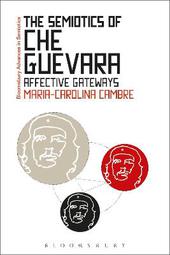
|
The Semiotics of Che Guevara: Affective Gateways
Hardback
Main Details
| Title |
The Semiotics of Che Guevara: Affective Gateways
|
| Authors and Contributors |
By (author) Maria-Carolina Cambre
|
| Series | Bloomsbury Advances in Semiotics |
|---|
| Physical Properties |
| Format:Hardback | | Pages:240 | | Dimensions(mm): Height 234,Width 156 |
|
| Category/Genre | Eclectic and esoteric religions and belief systems |
|---|
| ISBN/Barcode |
9781472505231
|
| Classifications | Dewey:302.24 |
|---|
| Audience | | Professional & Vocational | |
|---|
|
Publishing Details |
| Publisher |
Bloomsbury Publishing PLC
|
| Imprint |
Bloomsbury Academic
|
| Publication Date |
20 November 2014 |
| Publication Country |
United Kingdom
|
Description
Alberto Korda's famous photograph of Che Guevara titled the "Guerrillero Heroico" has been reproduced, modified and remixed countless times since it was taken on March 5, 1960, in Havana, Cuba. This book looks again at this well-known mass-produced image to explore how an image can take on cultural force in diverse parts of the globe and legitimate varying positions and mass action in unexpected global political contexts. Analytically, the book develops a comparative analysis of how images become attached to a range of meanings that are absolutely inseparable from their contexts of use. Addressing the need for a fluid and responsive approach to the study of visual meaning-making, this book relies on multiple methodologies such as semiotics, research-creation, multimodal discourse analysis, ethnography and phenomenology and shows how each method has something to offer toward the understanding of the social and cultural work of images in our globally oriented cultures.
Author Biography
Maria-Carolina Cambre is an assistant professor LTA in the Sociology Department at King's University College at the University of Western Ontario, Canada.
ReviewsMaria Cambre's book revises semiotics. From the pierced and wounded Sign emerges the heroic, resurrected and repaired. This book's radical semiotic gaze replaces older approaches to sign reading in order to revolutionize seeing itself. -- Chela Sandoval, Associate Professor in the Department of Chicana and Chicano Studies, University of California, Santa Barbara, USA
|